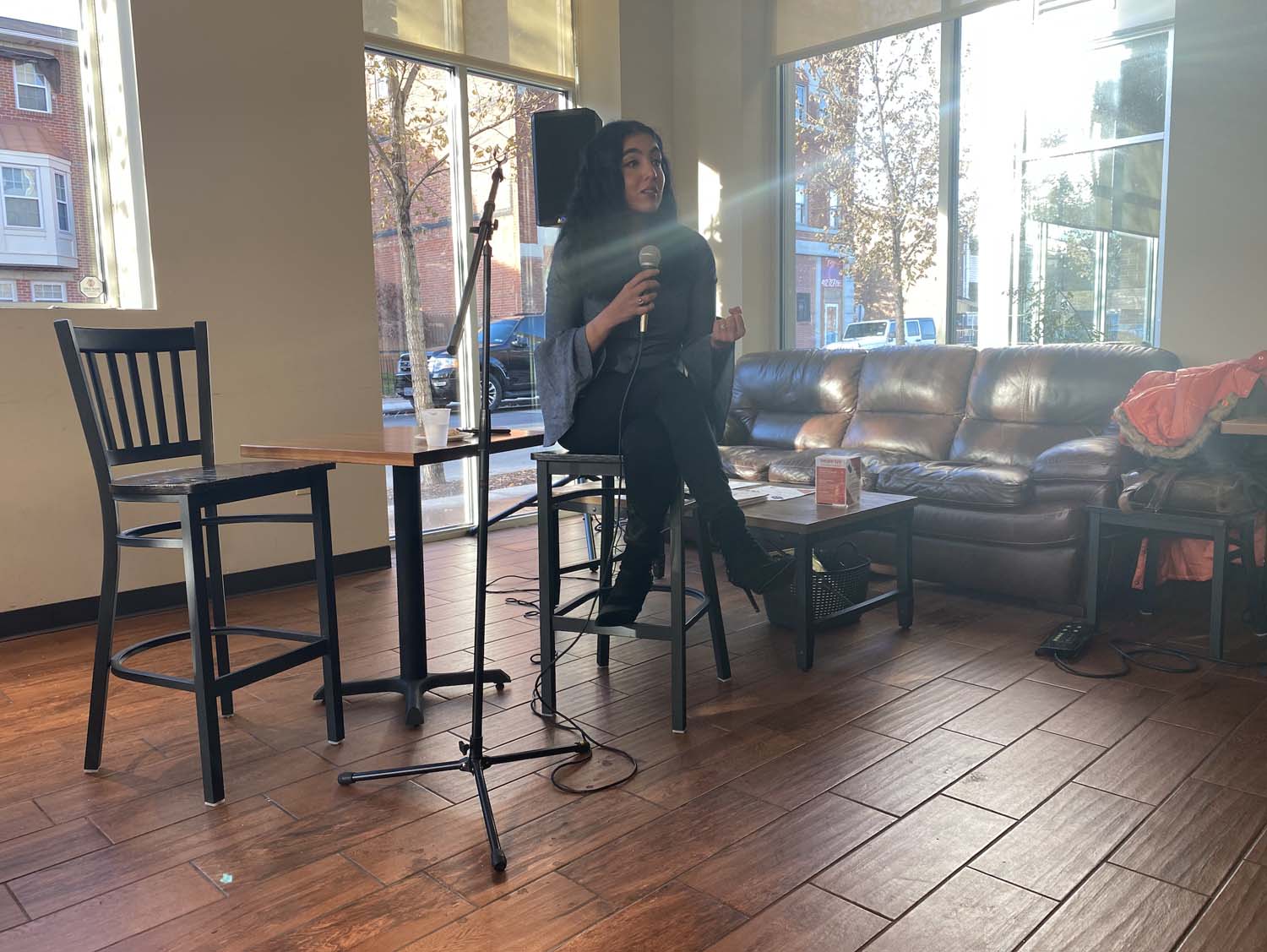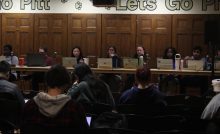Second lady of Pennsylvania Gisele Fetterman leads Homewood Community Cafe


Gisele Fetterman, the second lady of Pennsylvania, speaks about clothing insecurity at Homewood’s Everyday Cafe on Thursday evening.
Gisele Fetterman used to be invisible.
“My mom would say ‘I love you, have a great day, be invisible.’ That’s what I heard every single day for 15 years,” Fetterman said. “Being the housekeeper’s daughter, you meet the best and the worst people.”
Now she’s in the spotlight, and not just as the second lady of Pennsylvania. Fetterman is helping people who face food and clothing insecurity — some of the same issues she faced growing up in Brazil and then the United States as a first-generation immigrant.
At Thursday’s Community Cafe, Fetterman spoke about her life journey. As an immigrant who married the mayor of Braddock — now Pennsylvania Lt. Gov. John Fetterman — and went on to start numerous organizations to help out those who are facing need or injustice, Fetterman has no shortage of stories to tell.
“My work has always come from pain,” Fetterman said. “How you respond to pain with something beautiful.”
While the Community Cafe, an Honors College program, usually takes place at the top of the Cathedral of Learning, Thursday’s event was actually held in a cafe in the community, Homewood’s Everyday Cafe. The cafe is owned and operated by Bible Center Church and invests its earnings in Homewood-based causes and organizations. After taking a bus ride together to the cafe, about a dozen Pitt students gathered for the discussion along with others from the community.
Fetterman began by describing Brazil, her birthplace and former home. Raised with her brother by a single mom, Fetterman said violence was normal when she was growing up.
The turning point came when Fetterman’s mother and aunt were having dinner one night, Fetterman said. Her aunt shared that she had only been robbed seven times that year. Not wanting to accept that such a situation was the norm, Fetterman’s mother decided to take her kids and leave Brazil.
“It wasn’t the volume that was shocking but that she shared it as if it was normal,” Fetterman said. “She came home with a suitcase and asked that we pack our favorite things because we were going on an adventure. I was 7.”
The first in the family to immigrate, Fetterman and her mother arrived in New York unable to speak English. After finding someone on the street in Queens who offered to let them stay a few nights in their home, they soon found an apartment and Fetterman’s mother got a job as a domestic worker cleaning homes and as a coat-check girl.
As Fetterman began to learn English and grow accustomed to her new life as an undocumented immigrant, her mother would send her to school each morning with the same advice — be invisible.
Fetterman’s mother worked cleaning houses, where homeowners sometimes refused to pay her or would sexually assault her, Fetterman said. Because her mother was undocumented, there was nothing she could do without threats of deportation.
“I knew if I ever had a voice, I would use it,” Fetterman said. “The work that I do now was really cemented by my experiences in Queens.”
Living in an apartment with no furniture and facing food insecurity, Fetterman’s family survived by using what others threw away to furnish their apartment and put food on the table. No longer a child, she realized that she could use her experiences and struggles to help others rise out of similar situations.
Realizing the extent of waste in America, Fetterman became involved in food justice. She heard about the struggles of people in Braddock while working in food security nonprofits in Newark and decided to send a letter to the borough to see if she could be part of a solution. Fetterman had no idea at the time that the letter would connect her to her future husband.
“I shared the work that I was doing in Newark and that I wanted to visit and do something, and the letter ended up with John, who was mayor,” Fetterman said. “I came to visit and then he fell madly in love with me when I arrived.”
After moving to Braddock and identifying the food and clothing insecurity that people were facing, Fetterman began crafting a solution. Housed in old shipping containers, the Free Store was developed. Starting with herself and her friends, and then moving on to retailers and grocery stores, Fetterman collected donations that would stock a store where people facing insecurity could go to get what they needed without cost.
“I wanted to create something that was really dignified and loving. With thrift stores or food banks, you had to prove you had a need and that’s really dehumanizing for people,” Fetterman said. “You have to believe in people. People will rise up and meet your expectations every time.”
Fetterman also described other projects she had initiated, such as Hello Hijab which makes doll-sized headscarves for children with the purpose of increasing representation and fighting the stigma against women who wear hijabs.
“A child can see her ‘Frozen’ Anna doll and that whether or not she has the hijab, she is still the same doll,” Fetterman said.
Sophia Lex, a first-year biology major, said it was amazing to hear Fetterman speak so passionately about the things she had done.
“Starting a nonprofit has to be just about as hard as it can get,” said Lex. “Nobody wants to follow anything unless it’s money. It’s not about the idea, it’s about money. And she’s starting up these organizations where money isn’t even a factor.”
Cynthia Wallace, executive director of the Oasis Project that runs the Everyday Cafe, was thrilled to host Fetterman.
“Her accomplishments include so many things that speak to her heart for people,” Wallace said. “Are we looking at our next Michelle Obama? I’m thinking it!”
Even after the event concluded, audience members stuck around and continued talking about how Fetterman’s head-on approach to tackling issues could be applied to issues they care about.
“Not only was she a dominant presence in the room with an exquisite fashion sense, but she also carried out just about any idea that she had,” Lex said. “How could you not be inspired by that?”
Fetterman said that getting people to take positive action in their communities is easier than it may seem.
“I think of all the ideas I’ve had and all the need I saw that I didn’t act on, and I think so much of it is just deciding to act on it,” Fetterman said. “People are good. People see passion and they see sincerity and they want to be a part of it.”
Recent Posts
Review | Delayed checkouts at ‘The White Lotus’: An unoriginal third season
(Contains Spoilers) There is no meditation class, no reiki session, no nutritionally balanced, organic food…
Celebrating Women’s History Month with the HerStory Slam Event
Idaya Sasikumar, a first-year psychology student, took to the stage to read her personal story.…
Review | Michael Franti & Spearhead reflect on the power of love in new album ‘Welcome to the Family’
Nothing says “Welcome to the family!” like a new baby. Soul-rock band Michael Franti &…
How hurling put me on ESPN and in a National Championship game
Nothing is more difficult than joining a new club in college. It is terrifying when…
Column | It’s now or never for Henry Davis
When Henry Davis came into Monday night’s game against the Washington Nationals at PNC Park,…
Pitt men’s basketball navigating transfer portal difficulties
Pitt men’s basketball is like any other team in the world of large NIL deals…
